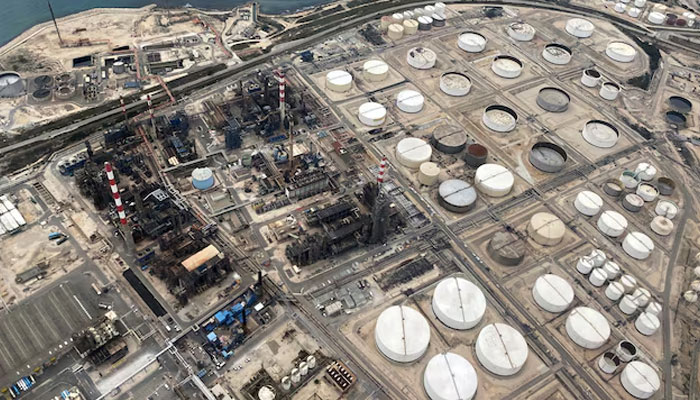Oil drops more than 4pc on reports of potential resolution to Libya dispute
Prices had fallen on belief that demand was being undercut because of sluggish economic growth in China
TRIPOLI: Oil prices dropped more than 4 percent on Tuesday to their lowest levels in nearly nine months after reports that a deal was imminent to resolve a dispute that has halted Libyan production and exports.
Ahead of the news of more oil possibly returning to the market, prices had fallen on the belief that demand was being undercut because of sluggish economic growth in China, the world’s biggest crude importer.
Brent crude futures were down $3.51, or 4.5 percent, to $74.02 a barrel at 11:31 am ET (15:31 GMT), the lowest level since December. West Texas Intermediate crude futures, which did not settle on Monday because of the US Labour Day holiday, were down $2.97, or 4.1 percent, at $70.58 - their lowest price since January.
The United Nations Support Mission in Libya (UNSMIL) said on Monday there was “significant” understanding between rival Libyan factions following talks in Tripoli to help resolve the crisis. UNSMIL said the two sides agreed to review a draft agreement with the goal of finalizing and signing the agreement on Tuesday.
Libya’s central bank governor Sadiq al-Kabir said a deal appears imminent to resolve the dispute and spur the resumption of oil output, Bloomberg reported on Tuesday.
The speculation about a deal is triggering momentum selling, said Ole Hansen, an analyst at Saxo Bank.
Libyan oil exports at major ports were halted on Monday and production curtailed across the country, six engineers told Reuters, continuing a standoff between rival political factions over control of the central bank and oil revenue.
Libya’s National Oil Corp (NOC) declared force majeure on its El Feel oilfield from Sept 2.
Total production had plunged to little more than 591,000 barrels per day (bpd) as of Aug. 28 from nearly 959,000 bpd on Aug 26, NOC said. Production was at about 1.28 million bpd on July 20, the company said.
The Libya news compounded an earlier fall in prices tied to weak Chinese economic data.
“The weaker-than-expected Chinese manufacturing PMI over the weekend likely exacerbated concerns about the Chinese economy’s performance,” said Charalampos Pissouros, senior investment analyst at brokerage XM.
China reported on Monday that new export orders fell for the first time in eight months in July and that prices of new homes rose in August at their weakest pace this year.
Hopes that the US driving season would propel prices to new 2024 highs this summer have also failed to materialize, said Fawad Razaqzada, market analyst at Forex.
“The fact that recent data shows no signs of any acceleration in import demand in China, Europe or North America points to a situation where the oil market is not going to be as tight as expected a few months ago,” Razaqzada said.
Some supply is set to return to the market as eight members of OPEC and affiliates, together known as OPEC+, are scheduled to boost output by 180,000 bpd in October. The plan is likely to go ahead regardless of demand worries, industry sources said.
Disruptions to supply flows from the Middle East after two oil tankers were attacked on Monday in the Red Sea off Yemen were not enough to buoy prices. The tankers did not sustain major damage.
-
 Prince William Questions Himself ‘what’s The Point’ After Saudi Trip
Prince William Questions Himself ‘what’s The Point’ After Saudi Trip -
 James Van Der Beek's Friends Helped Fund Ranch Purchase Before His Death At 48
James Van Der Beek's Friends Helped Fund Ranch Purchase Before His Death At 48 -
 King Charles ‘very Much’ Wants Andrew To Testify At US Congress
King Charles ‘very Much’ Wants Andrew To Testify At US Congress -
 Rosie O’Donnell Secretly Returned To US To Test Safety
Rosie O’Donnell Secretly Returned To US To Test Safety -
 Meghan Markle, Prince Harry Spotted On Date Night On Valentine’s Day
Meghan Markle, Prince Harry Spotted On Date Night On Valentine’s Day -
 King Charles Butler Spills Valentine’s Day Dinner Blunders
King Charles Butler Spills Valentine’s Day Dinner Blunders -
 Brooklyn Beckham Hits Back At Gordon Ramsay With Subtle Move Over Remark On His Personal Life
Brooklyn Beckham Hits Back At Gordon Ramsay With Subtle Move Over Remark On His Personal Life -
 Meghan Markle Showcases Princess Lilibet Face On Valentine’s Day
Meghan Markle Showcases Princess Lilibet Face On Valentine’s Day -
 Harry Styles Opens Up About Isolation After One Direction Split
Harry Styles Opens Up About Isolation After One Direction Split -
 Shamed Andrew Was ‘face To Face’ With Epstein Files, Mocked For Lying
Shamed Andrew Was ‘face To Face’ With Epstein Files, Mocked For Lying -
 Kanye West Projected To Explode Music Charts With 'Bully' After He Apologized Over Antisemitism
Kanye West Projected To Explode Music Charts With 'Bully' After He Apologized Over Antisemitism -
 Leighton Meester Reflects On How Valentine’s Day Feels Like Now
Leighton Meester Reflects On How Valentine’s Day Feels Like Now -
 Sarah Ferguson ‘won’t Let Go Without A Fight’ After Royal Exile
Sarah Ferguson ‘won’t Let Go Without A Fight’ After Royal Exile -
 Adam Sandler Makes Brutal Confession: 'I Do Not Love Comedy First'
Adam Sandler Makes Brutal Confession: 'I Do Not Love Comedy First' -
 'Harry Potter' Star Rupert Grint Shares Where He Stands Politically
'Harry Potter' Star Rupert Grint Shares Where He Stands Politically -
 Drama Outside Nancy Guthrie's Home Unfolds Described As 'circus'
Drama Outside Nancy Guthrie's Home Unfolds Described As 'circus'




